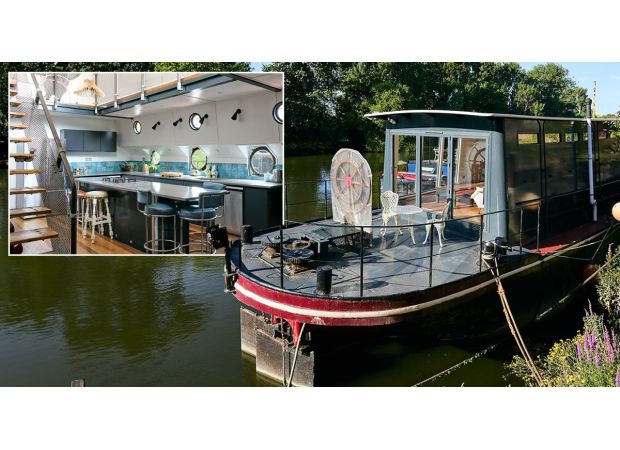A London houseboat worth £1,000,000 is up for sale, and it's larger than many apartments.
It's lovingly known as 'Big Ness.'

Are you tired of paying rent for your flat and dreaming of a simpler, more relaxed lifestyle? Walking along the beautiful canals of London, it's easy to become captivated by the idea of trading in your traditional home for a charming houseboat. And with the rising popularity of houseboats as a more affordable alternative to expensive city living, it's no wonder they've become the latest trend in property ownership.
But before you start packing up your belongings, it's important to note that houseboats are not what they used to be. Once known as a budget-friendly option in one of the world's most expensive cities, houseboats have undergone a transformation and are now highly sought after. In fact, a recently renovated barge with a stunning kitchen that rivals most brick-and-mortar homes has just been listed for a whopping £1,000,000.
Affectionately named 'Big Ness', this houseboat boasts a spacious 2,100 square feet with four cabins and an open-plan kitchen and reception room perfect for entertaining guests. It's no surprise that this luxurious barge was previously owned by a chef. To put it into perspective, the average size of a flat in the UK is only 656 square feet, making this houseboat over three times larger.
While the price may seem steep for a houseboat, it's located in a highly desirable area, moored on the Victoria Steps Quay in Brentford, just a stone's throw away from Kew Bridge. This houseboat also offers the unique feature of being split across two floors, with porthole windows providing stunning views of the River Thames and allowing plenty of natural light to flood in.
The two floors are connected by a custom-built wooden staircase, a luxury rarely found in traditional houseboats. In fact, this barge is so spacious that the agents have even suggested the potential to convert a section into a self-contained studio flat, providing an opportunity for rental income. And the perks don't stop there - the share of the freehold not only covers the water, but also includes riverside land, allocated parking, storage, office space, and a garden workshop, all for relatively low mooring fees of only £4,050 per year.
To put this into perspective, data from Zoopla reveals that the average mooring fees in the UK range from £2,000 to £18,000 per year - making this a great deal for such a luxurious houseboat.
Moving on to the practicalities of living on a houseboat, there are certainly some pros and cons to consider. According to experts at Zoopla, one major advantage is that buying a houseboat allows you to avoid paying stamp duty. Until March 31, 2025, homeowners are exempt from this fee for properties valued up to £250,000, but for properties up to £675,000, a 5% fee is required. Anything above that incurs fees of 10% and 12%, respectively.
Living on a houseboat also offers the opportunity to reside in exclusive postcodes at a fraction of the cost of traditional homes, as well as a chance to embrace an outdoor lifestyle and connect with nature. However, limited storage space is a major downside, so it's important to declutter before making the move.
For those interested in the houseboat lifestyle, it's essential to consider the costs involved. On average, a boat survey will cost between £350 and £400, plus any necessary repairs. This is an important step to assess the condition of a second-hand boat and avoid any surprises. In addition, a boat safety certificate, typically priced at £150, and a boat licence, ranging from £510 to £1,100 per year, are necessary expenses.
Insurance for a houseboat can cost over £200 per year, and as previously mentioned, mooring fees average between £2,000 and £18,000 per year. You'll also need to budget for hull blacking and painting, which is recommended every three to five years and can cost around £850. Taking the boat out of the water for this process can cost up to £350, and the work itself can be around £500. Lastly, it's important to budget £20 per month for emptying the contents of your toilet.
In addition to the financial considerations, it's important to commit to maintaining the boat, including engine servicing and hull blacking every few years. While traditional homes often increase in value over time, houseboats tend to depreciate, meaning you may not make a profit if you decide to sell. And living closer to the elements can also bring its own set of challenges, such as noisy rainstorms and retaining heat during the summer months.
Ultimately, living on a houseboat is about embracing a unique lifestyle. It offers the opportunity to live in a beautiful, tranquil setting at a lower cost, but it's important to carefully consider the practicalities and costs involved before making the leap. Do you have any stories or experiences of living on a houseboat? We'd love to hear them - send us an email at [insert email address].






